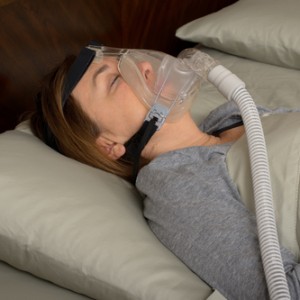 An Original Investigation paper published in the January 13 issue of JAMA – The Journal Of The American Medical Association reports that sleep study participants who were also asthmatic were observed to be at increased risk for developing obstructive sleep apnea, and the longer a subject had been an asthma sufferer, the stronger the association between the two disorders.
An Original Investigation paper published in the January 13 issue of JAMA – The Journal Of The American Medical Association reports that sleep study participants who were also asthmatic were observed to be at increased risk for developing obstructive sleep apnea, and the longer a subject had been an asthma sufferer, the stronger the association between the two disorders.
In adults, obstructive sleep apnea (OSA), a potentially serious sleep disorder in which breathing repeatedly stops and starts during sleep. It is highly and increasingly prevalent, and is associated with adversely affecting health and a higher risk of death. The most noticeable OSA symptom is snoring. While OSA can manifest at any age, it most commonly affects middle-aged and older adults and people who are overweight, so increased incidence of the disease may be associated with increasing rates of obesity in our society.
Although a few studies have suggested an asthma-OSA association, it has been unknown whether asthma is a causal risk factor for OSA, according to background information in the article.
 Mihaela Teodorescu, M.D., M.S., an associate professor of medicine at the University of Wisconsin School of Medicine and Public Health’s Center for Sleep Medicine and Sleep Research who practises the William S. Middleton Memorial Veteran’s Hospital in Madison, Wisconsin, specializes in sleep and is certified by the American Board of Sleep Medicine. She is also a board certified specialist in Pulmonary Disorders and Critical Care Medicine. Dr. Teodorescu’s research interests include the bidirectional relationship between sleep and its disorders with lung diseases, with a special focus on asthma.
Mihaela Teodorescu, M.D., M.S., an associate professor of medicine at the University of Wisconsin School of Medicine and Public Health’s Center for Sleep Medicine and Sleep Research who practises the William S. Middleton Memorial Veteran’s Hospital in Madison, Wisconsin, specializes in sleep and is certified by the American Board of Sleep Medicine. She is also a board certified specialist in Pulmonary Disorders and Critical Care Medicine. Dr. Teodorescu’s research interests include the bidirectional relationship between sleep and its disorders with lung diseases, with a special focus on asthma.
A team of research colleagues led by Dr. Teodorescu examined the relationship between asthma and development of new OSA cases in the Wisconsin Sleep Cohort Study, whose participants were randomly selected adult employees of state agencies aged 30 to 60 in 1988. Since the study’s inception, participants have attended overnight polysomnography sessions in-laboratory and completed health-related questionnaires at approximate four year intervals, results of which are reported in the JAMA paper, entitled: “Association Between Asthma and Risk of Developing Obstructive Sleep Apnea” (JAMA. 2015;313(2):156-164. doi:10.1001/jama.2014.17822).
Co-authors with Dr. Teodorescu on the study are Jodi H. Barnet, MS, Erika W. Hagen, PhD, Terry B. Young, PhD, Mari Palta, PhD, and Paul E. Peppard, PhD, of Population Health Sciences at the University of Wisconsin School of Medicine and Public Health. Dr. Palta is also associated with the school’s Biostatistics and Medical Informatics department.
[adrotate group=”3″]
The coauthors’ objective was to examine the prospective relationship of asthma with incident OSA, with asthma and covariate information assessed during the polysomnography studies through March 2013. The 547 participants provided 1105 4-year follow-ups questionnaires, in which they self-reported presence and duration of any physician-diagnosed asthma.
The researchers found that 22 of 81 participants (27% ) with asthma also experienced incident OSA over their first observed 4-year follow-up interval compared with 75 of 466 participants (16%) without asthma. Across all 4-year intervals, participants with asthma experienced 45 cases of incident OSA during 167 4-year intervals (27% ) and participants without asthma experienced 160 cases of incident OSA during 938 4-year intervals (17%). Asthma duration was related to both new OSA and new OSA with habitual sleepiness. Participants with preexisting asthma were found to have nearly 40 percent greater risk of developing new-onset OSA compared with participants without asthma.
“This study prospectively examined the relationship of asthma with OSA assessed with laboratory-based polysomnography and found that preexistent asthma was a risk factor for the development of clinically relevant OSA in adulthood over a 4-year period. Furthermore, the asthma-OSA association was significantly dose-dependent on duration of asthma,” the authors write, concluding that “Studies investigating the mechanisms underlying this association and the value of periodic OSA evaluation in patients with asthma are warranted.”
Sources:
JAMA
University of Wisconsin School of Medicine and Public Health Center for Sleep Medicine and Sleep Research
Image Credit:
University of Wisconsin School of Medicine and Public Health Center for Sleep Medicine and Sleep Research

